Summary
David Cameron considers the make-up of his Cabinet after the Conservatives' election victory
Michael Gove is made justice secretary and Chris Grayling, leader of the Commons
George Osborne, Theresa May, Philip Hammond, Michael Fallon and Nicky Morgan remain in jobs they held in coalition
Vacancies at the top table include business secretary, energy secretary, and treasury secretary after senior Lib Dems lost their seats
Harriet Harman has taken over as acting Labour leader after Ed Miliband stood down
The Lib Dems are also looking for a new leader after Nick Clegg said he would make way
Live Reporting
Dominic Howell and Marie Jackson
Sunday Telegraph frontpublished at 23:33
Reshuffle latestpublished at 23.21
23.21More on the appointments to David Cameron's new government announced tonight. Former Immigration Minister Mark Harper is also expected to become the Conservative chief whip. Full story here.
Observer front pagepublished at 23:13
23:13Sunday Express front pagepublished at 22:58
22:58Independent on Sunday front pagepublished at 22.40
22.40Liz Kendall leadership bidpublished at 22.28
22.28Sunday Times political editor tweets:
'Despicable display'published at 22.07
22.07Four police officers and a member of police staff have been injured in "unplanned" anti-austerity protests in Westminster today.
During the protest graffiti was daubed on a war memorial in Whitehall.
A Downing Street spokesman said: "Spraying graffiti on war memorials is a despicable display of disrespect for those who fought and died for their country, particularly at a time when the whole nation comes together to commemorate the 70th anniversary of VE Day."
#ThanetRiggedpublished at 22.04
22.04On Twitter at the moment the hashtag #ThanetRigged is gaining popularity after some UKIP supporters appear to be suggesting that Nigel Farage missing out on his chance to become MP of South Thanet involved some sort of foul play.
The Huffington Post has pulled together an article, external from some of the tweets.
Cabinet appointments: Gove to justicepublished at 22:04
22:04BreakingMichael Gove will become Secretary of State for Justice and Lord Chancellor. He will be given a brief to look at prisons, sentencing and criminal justice. Chris Grayling will become Leader of the House of Commons. Nicky Morgan will continue as Education Secretary and Minister for Equalities.
Prescott criticises Miliband campaignpublished at 21.48
21.48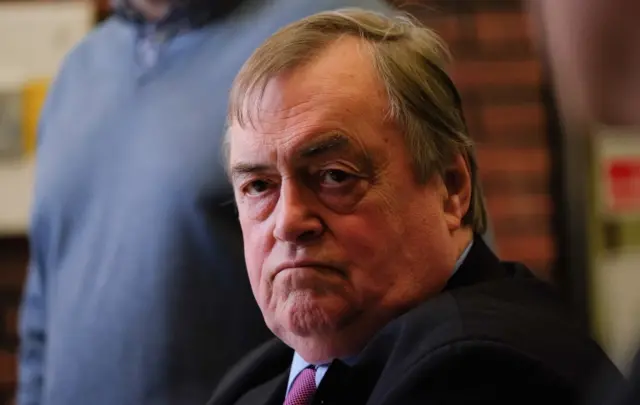 Image source, Getty Images
Image source, Getty ImagesLabour veteran John Prescott has criticised Ed Miliband's failed "presidential-type" general election campaign.
The former deputy prime minister said he wasn't keen on the Labour leader's "Hell, yes, I'm tough" boast and said the party had paid the price for failing to defend the economic record of the last Labour government in the last parliament.
Writing in the Sunday Mirror, Lord Prescott said it had been a "bloody disastrous" result for the party as David Cameron secured the first outright majority for the Conservatives since 1992.
"We fought a presidential-type election based on computers, charts, focus groups and even the American language - Hell yes? Hell no!" he wrote.
Umunna: 'Down but not out'published at 21:40
21:40Shadow business secretary
Goldsmith: 'Tattered relationship'published at 21:20
21:20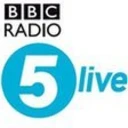 BBC Radio 5 Live
BBC Radio 5 LiveZac Goldsmith, who was re-elected as the Conservative MP for Richmond Park, with a majority of 23,000, says his party has work to do to repair the damaged relationship between voters and politicians.
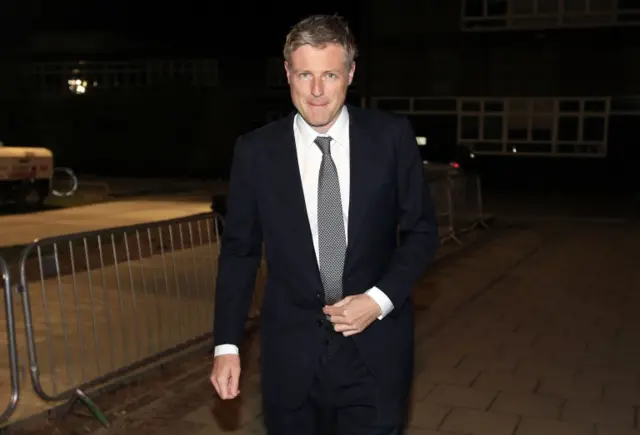 Image source, PAQuote Message
Image source, PAQuote MessageOver the next five years it is imperative that we not only deliver the promises that we made, but that we do so emphatically. And I think if we can do that, we will not only be improving our chances next time around, but we will be helping to repair the relationship between people and power, which is pretty tattered at the moment."
Byrne 'so sorry' for notepublished at 21.07
21.07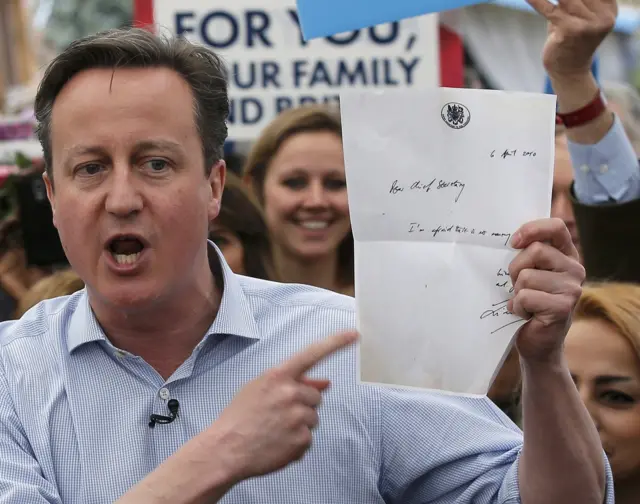 Image source, PA
Image source, PAThe note famously left by Labour's outgoing chief secretary to the Treasury, Liam Byrne, for his successor ("I'm afraid there is no money" it said) was regularly brandished by David Cameron during the election campaign.
The PM used it to highlight what he said was Labour's disregard for the public finances. Now Mr Bryne has given his perspective in an article for the Guardian, external, saying he is "so sorry" for what he calls a "crass mistake":
Quote MessageDavid Cameron may have carried that note around with him during the campaign. But I, too, have carried it every day – in my head. I always will. As a reminder of how much harder I will always have to work to repay the people I let down and to help rebuild Labour as a party of government determined to fight the injustices that scar our communities and the failures that hold us back from becoming the country we can be.
From the scenepublished at 20.57
20.57The BBC's Brian Wheeler was in Westminster this evening, where four people were arrested during what police called an "unplanned" anti-austerity protest:
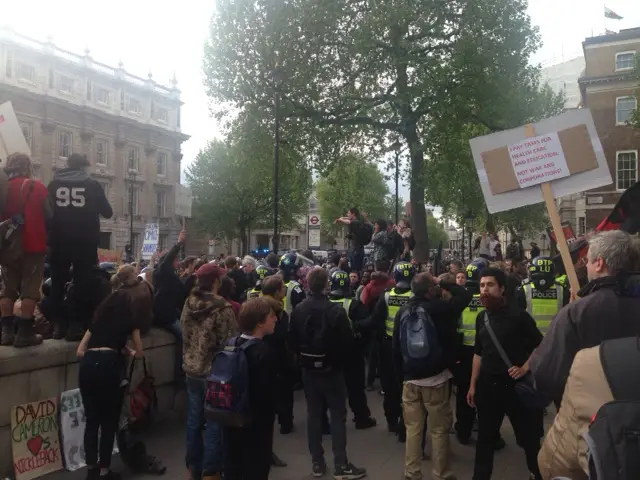 Quote Message
Quote MessageThere is a very heavy police presence, with dozens of officers in riot gear. Most of the protesters are blocked in by police vans with their blue lights flashing, near the Cenotaph. The young crowd are cheering, clapping, blowing whistles and waving anti-Tory placards. It seems peaceful at the moment. There's almost a party atmosphere."
Campaign in poetry and govern in prosepublished at 20:28
20:28The Spectator challenged its readers to put their own twist on Rudyard Kipling’s rousing poem, If. Here's the first verse from one of the winners:
IF – For Nicola (by Brian Murdoch)
If you can lose a referendum and still act
As if you’d won it, time and time again;
If you can claim you’re going to make a pact
But never make your real conditions plain;
If you can try to split from the UK
Then six months later make it clear to see
That now you want to rule the lot your way,
Yet still play down illogicality;
For the rest of the poem and other winners, click here., external
Quote MessageFour protest arrests, say policepublished at 20.01
20.01Police release an updated statement on the "unplanned" anti-austerity protests in Westminster.
The spokesman said: "Four people have been arrested for a variety of offences under the Public Order Act, 1986.
"Officers are aware of criminal damage to the Women's War Memorial in Whitehall and are investigating.
"There are no reported injuries to any members of the public.
"One police officer and one member of police staff have been injured policing this protest. Both are being treated in hospital. The officer is being treated for a suspected dislocated shoulder. The member of police staff is being treated for a cut lip after being struck by an object.
"Officers are working to minimise disruption to all road users and members of the public passing through the area."
'Only lost once'published at 19:53
19:53Labour Councillor for South Heaton
Graffiti on war memorialpublished at 19.45
19.45Mark Wallace, executive editor of conservativehome.com
Westminster protest updatepublished at 19:17
19:17BBC colleagues tell us that the protest around Whitehall seems to have settled down now. About 100 protesters were kettled, we're told. There have been no reports of any arrests so far.
Send us your commentspublished at 18:53
18:53Email: politics@bbc.co.uk
Gagan Kumar
Hats off to Tories think tank. Tempting Nick Clegg to be Deputy PM probably cost his party the vote share he had in the last election. Scottish referendum seems to have cost Labour their seat share in Scotland. Win win for the Tories and lose lose for the opponents.